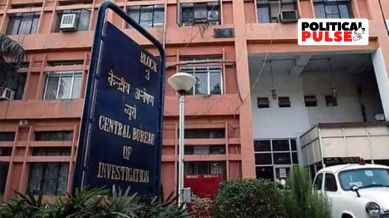As Karnataka withdraws general consent to CBI, which other states have taken this route
This is not the first time Karnataka has done so. After the Janata Dal government withdrew general consent in 1998, it was not renewed for eight years.

The Karnataka government on Thursday withdrew general consent to the CBI, becoming the eighth state to do so. Other states include Punjab, Jharkhand, Kerala, West Bengal, Telangana, Meghalaya, and Tamil Nadu. Except for Meghalaya, all these states are ruled by parties in Opposition at the Centre.
Rajasthan, Andhra Pradesh, Mizoram and Chhattisgarh too had earlier withdrawn consent but restored the same following government change. A majority of these withdrawals have happened after the Narendra Modi government came to power at the Centre. In 2018, in the wake of such withdrawals, the Supreme Court remarked this was “not a desirable position”.
monthly limit of free stories.
with an Express account.
Withdrawal of general consent is not unique to present times though. States such as Sikkim, Nagaland, Chhattisgarh, and Karnataka have done this throughout the history of the agency. Karnataka, particularly has done it several times under various governments.
In 1998, the Janata Dal government of Chief Minister J H Patel withdrew general consent to the CBI in Karnataka. The Congress government of S M Krishna, which took over in 1999, did not revoke the order. The state Home Minister at the time was Mallikarjun Kharge, the current Congress national president.
“Consent wasn’t renewed for eight long years. The CBI had to virtually close down its office (in Karnataka),” said an officer who was with the agency at the time. The CBI had to seek the permission of the state government for every case and every search it conducted on central government employees, the officer said.
Unlike the National Investigation Agency (NIA), which is governed by The NIA Act, 2008, and has jurisdiction across India, the CBI is governed by The Delhi Special Police Establishment (DSPE) Act, 1946, and must mandatorily obtain the consent of the state government concerned before starting the investigation of a crime in a state. The consent of the state government can be either case-specific or general.
A “general consent” is normally given by states to help the CBI in the seamless investigation of cases of corruption against central government employees in their states. Almost all states have traditionally given such consent. This is done to ensure consent by default in the absence of which the CBI would have to apply to the state government in every case, and before taking even small actions.
During the rule of the Modi government, Mizoram was the first state to withdraw consent in 2015. The Congress was in power in the state at the time, with Lal Thanhawla as the Chief Minister. In 2018, the Mizo National Front (MNF) under Zoramthanga came to power; however, even though the MNF is an NDA ally, consent to the CBI was not restored. The current government under Lalduhoma restored CBI consent in December 2023.
In November 2018, the West Bengal government led by Mamata Banerjee withdrew the general consent that had been accorded to the CBI by the Left Front government in 1989. West Bengal announced its decision within hours of Andhra Pradesh, then ruled by N Chandrababu Naidu’s Telugu Desam Party (TDP), taking a similar decision.
“What Chandrababu Naidu has done is absolutely right. The BJP is using the CBI and other agencies to pursue its own political interests and vendetta,” Banerjee said at the time.
After Naidu’s government was replaced by that of Y S Jagan Mohan Reddy in 2019, Andhra Pradesh restored consent. This has continued under the current Naidu regime whose party is now part of the NDA.
The Congress government of Chief Minister Bhupesh Baghel in Chhattisgarh withdrew consent in January 2019. Punjab, Maharashtra, Rajasthan, Kerala, and Jharkhand followed in 2020. In 2022, the Telangana government then run by the Bharat Rashtra Samithi (BRS) withdrew the general consent to the central agency.
Maharashtra restored consent to CBI in 2022 after the Maha Vikas Aghadi (MVA) government led by Uddhav Thackeray fell and the NDA government led by Eknath Shinde came to power. Chhattisgarh restored consent in December 2023 after a BJP government came to power. Rajasthan too restored consent in January this year after the Ashok Gehlot government of the Congress was defeated in December 2023 and the BJP came to power.
At the time of withdrawing consent, all states alleged that the central government was using the CBI to unfairly target the opposition.
The accusations of CBI not being partisan have been more pronounced recently. After the 2018 amendments to the Prevention of Corruption Act, 1988, the Centre has come to exercise power over the agency not just administratively but also legally.
In 2018, the government pushed through Parliament amendments to Section 17A of the Act making it mandatory for the CBI to seek the Centre’s permission before registering a case of corruption against any government servant. Earlier, the Centre mandated that such permission was required only for officials of the level of joint secretary and higher. The amendments were brought after the Supreme Court struck down the government’s directive.
CBI officers say the 2018 amendment virtually means the agency can investigate only the officers that the government of the day wants to be investigated. Corruption cases registered by the agency dropped by over 40% between 2017 and 2019.